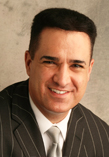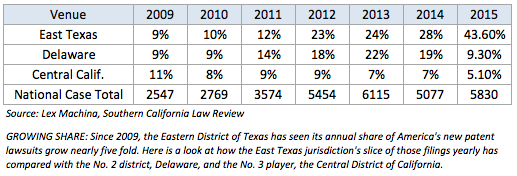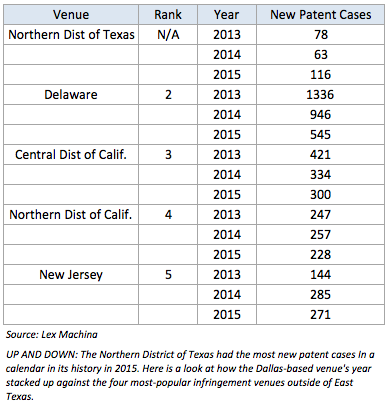© 2015 The Texas Lawbook.
By Jeff Bounds
(Jan. 7) – America’s four busiest patent-dispute forums not named “the Eastern District of Texas” saw declines in 2015 in new infringement cases. But a dark horse candidate may have simultaneously emerged to possibly handle more infringement dust-ups going forward: The Northern District of Texas.
The Dallas-based jurisdiction saw 116 new patent suits last year, its highest annual total since at least 2000, according to California data provider Lex Machina.
Last year’s tally was about 48 percent more than the district’s previous high-water mark of 78 from 2013, Lex Machina data shows. The Northern District had 63 infringement cases filed in 2014.
To be sure, it’s doubtful the Northern District will supplant its East Texas brethren anytime soon as patent owners’ go-to forum for waging infringement litigation.
“The courts in the Eastern District are easily among the most experienced, efficient and consistent in the country when handling patent cases,” said Demetrios Anaipakos, a partner at Ahmad, Zavitsanos, Anaipakos, Alavi & Mensing in Houston.

Still, the Northern District has adopted rules for handling patent cases that lend East Texas-type efficiency to jurists’ oversight of infringement litigation, lawyers say.
“While all the judges in the Northern District are excellent, the ones who take patent cases are highly regarded as being very fair and efficient in their management of patent litigation,” said Steven Williams, a shareholder at Dallas’s McDole Williams.

The program ensures all Northern District patent litigation gets assigned to one of three district judges in Dallas: Barbara M.G. Lynn, David Godbey or Ed Kinkeade.
“The experience and expertise of these judges, combined with well-established local patent rules, make the Northern District an attractive venue,” said Kelly Kubasta, a shareholder in Dallas at Ferguson, Braswell & Fraser.
Small Numbers – But Growing
Because the number of patent suits filed in the Northern District remains relatively small, it remains difficult to gauge what success its participation in the pilot program may have had so far in attracting patent owners to have their disputes adjudicated there.
After all, patent owners filed 341 infringement cases in East Texas in the nine business days surrounding Thanksgiving last year. That is more than were filed in the Northern District in the last four years combined, Lex Machina data shows.
Thom Tarnay, partner and leader of the intellectual property group in Sidley Austin’s Dallas office, notes that two plaintiffs, Icon Laser Solutions and Avioniqs, accounted for 56 Northern District cases in 2015, or nearly half of the venue’s new patent matters last year.
“In 2015, the apparent jump may be explained by just a few plaintiffs who chose to file many cases there, rather than any broader trend,” he said.
Still, in a year when patent complaints concentrated like never before in a single judicial district, the Northern District saw its infringement cases increase – while four of the largest patent-dispute venues posted decreases, Lex Machina data shows. (See chart.)

Future Advantage on Venue Questions?
Nonetheless, the Northern District may have an advantage over its East Texas neighbors at some point in an emerging battleground about which venue should host a given patent case, attorneys say.
Over the past few years, the Federal Circuit, which handles appeals in patent cases, has frequently ruled in favor of East Texas defendants that have asked to have their cases transferred to other venues, lawyers say.
Since 2008, the Federal Circuit has reportedly granted at least 19 mandamus requests concerning change-of-venue motions in the Eastern District.
The issue could come to a head soon.
The panel is reportedly now weighing arguments in a potentially significant venue-related squabble involving a business called TC Heartland, which is facing infringement claims from Kraft Foods.
Kraft sued TC Heartland in the District of Delaware. TC Heartland wants to move the case to Indiana, and has asked the appellate panel to re-consider a 1990 ruling it made that essentially allowed patent plaintiffs to file their complaints anywhere defendants have supposedly committed “acts of infringement.”
A friend-of-the-court brief from a trio of public interest groups argued the 1990 ruling in VE Holding vs. Johnson Gas Appliance has allowed patent owners to go “forum shopping” – and that their cases often wind up in East Texas as a result.

The three argued that the VE ruling conflicts with what Congress intended when it created a statute that permits district judges to transfer cases “for the convenience of parties and witnesses” and “in the interest of justice.”
Meanwhile, the House Judiciary Committee in June recommended that the rest of the chamber consider a marked-up version of the Innovation Act (HR-9,) legislation that would put sharp limitations on venues that can hear patent cases.
For instance, the bill would change existing U.S. law to limit venues on patent cases to spots such as where “the defendant has its principal place of business or is incorporated.”
Alternatively, a judicial district could pass muster if it is where the defendant “has committed an act of infringement and has a regular and established physical facility that gives rise” to the infringement,” the legislation says.
The bill faces an uncertain future, with various opponents having voiced concerns about it. The Congressional-monitoring web site GovTrack says the Innovation Act has a 36 percent chance of being enacted.
It is unclear what could ultimately transpire with that legislation. Similarly, Federal Circuit’s forthcoming decision in the change-of-venue dispute between TC Heartland and Kraft remains hard to guess.
Still, one thing is clear: The patent litigation party in the Eastern District may not last forever.
While the Northern District’s patent docket may never resemble the caseload that East Texas judges are handling now, it could ultimately grow if appellate or cCongressional forces put the kibosh on the frenzy of infringement litigation in spots like Marshall and Texarkana, attorneys say.
“With the larger corporate base in the Dallas-Fort Worth region, the ability to make cases filed in the Northern District ‘stick’ is greater,” Kubasta said.
© 2015 The Texas Lawbook. Content of The Texas Lawbook is controlled and protected by specific licensing agreements with our subscribers and under federal copyright laws. Any distribution of this content without the consent of The Texas Lawbook is prohibited.
If you see any inaccuracy in any article in The Texas Lawbook, please contact us. Our goal is content that is 100% true and accurate. Thank you.
